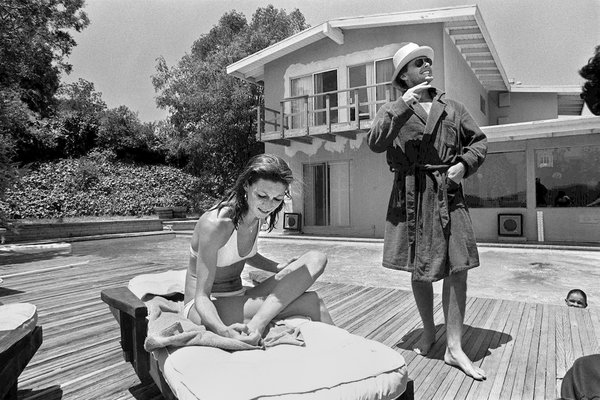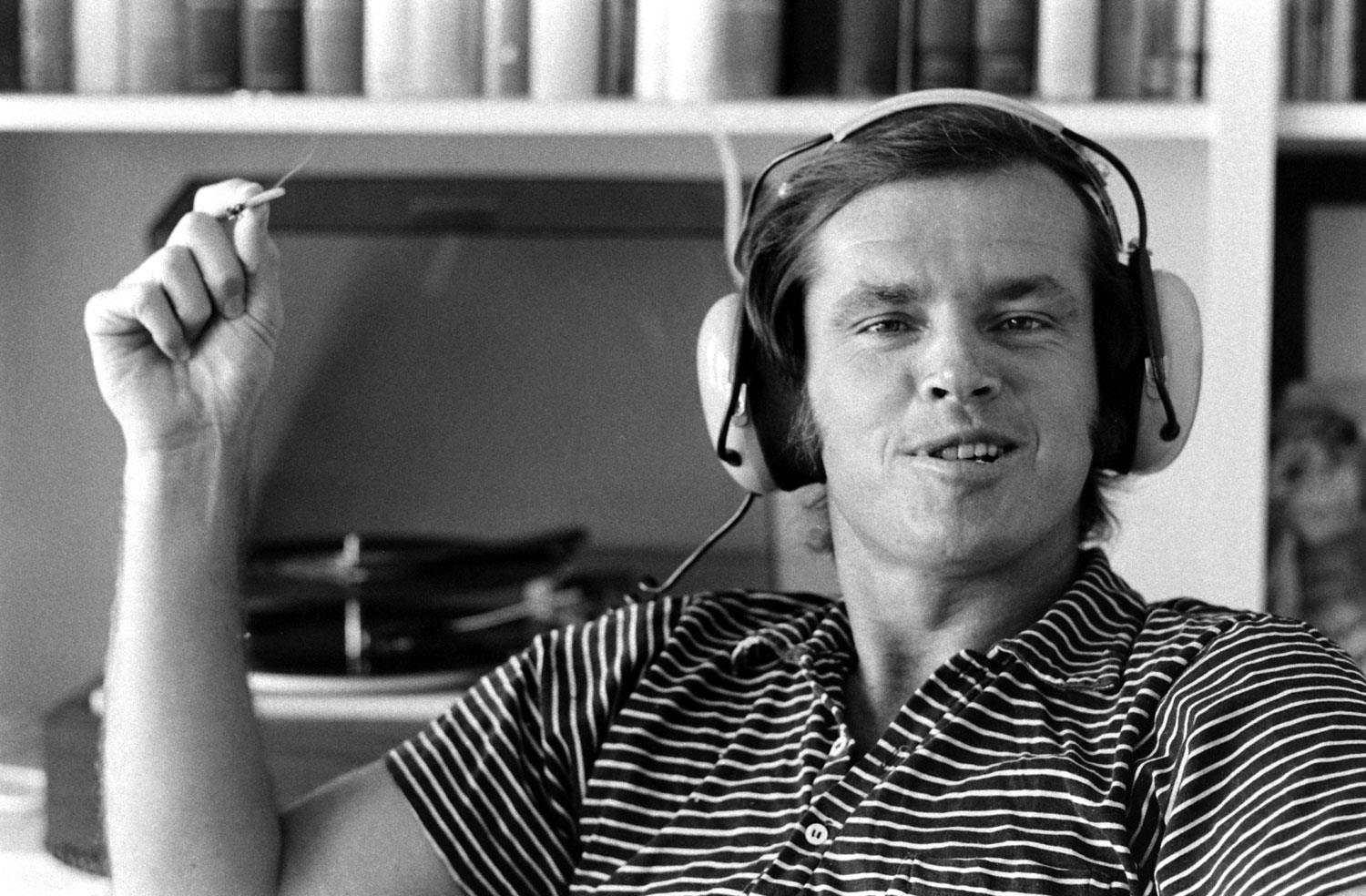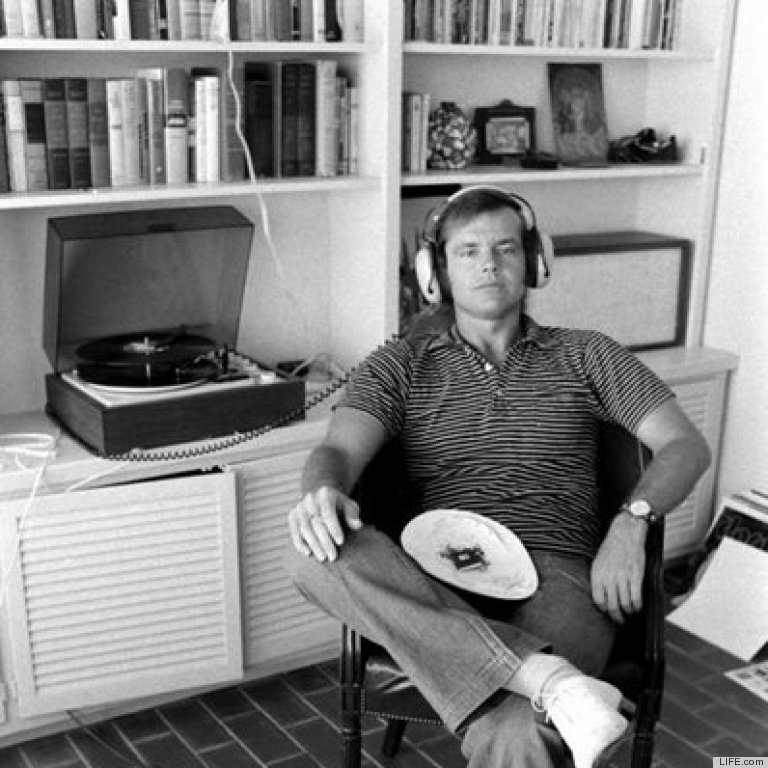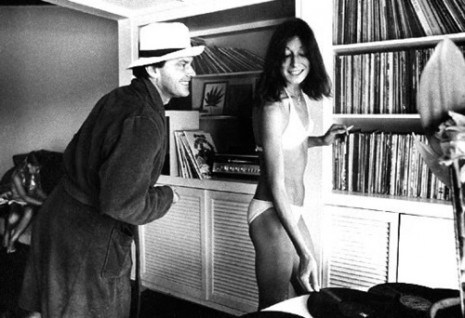As one of the principals behind Easy Rider, Jack Nicholson came of age creatively as movies became “important” in America–well, important in a way they hadn’t consistently been before–in a sociological and political sense. That put them and their makers at the center of the picture. By the 1980s, the actor-writer-director was bemoaning the loss of this cultural importance. He still gave great performances, but they mattered less by the standards he’d become accustomed to. The game had changed, and it’s never changed back.
In 1979, Peter Lester of People profiled Nicholson at the time of The Shining, when he was still feeling it. An excerpt:
He reigns from his aerie carved high into a hillside, with all of L.A. breathtakingly at his feet. “I pick spots,” beams Jack of his home of 10 years, reachable only by a well-secured road shared by neighbor Marlon Brando. The living room and dining room open onto a wide deck, whose centerpiece is a large swimming pool. A black open-air Jacuzzi bath that took three years to gouge into the rock commands another overlook. “The Jacuzzi was my original symbol of achievement, status and luxury,” says Nicholson, who steps from the tub every evening at twilight to dry in balmy breezes.
The rooms are lined with art—Rodin, Magritte, Tiepolo. The den boasts a wall-size TV screen. “I don’t like it in my living room,” he says. “I’m still holding out for a world in which people talk.” Looking out the window of the small master bedroom upstairs, Jack deadpans: “I built a balcony on here as an escape route. You can jump into the pool.” Down the corridor is the one feminine enclave in the rustically masculine surroundings: girlfriend Anjelica Huston’s bedroom, with a pair of sculpted golden wings (a gift from Jack) suspended in the corner.
“I certainly would say she’s the love of my life,” declares Nicholson of Anjelica, 29, the actress daughter of esteemed director-actor John Huston. Nicholson concedes that “we’ve striven for a straightforward, honest, yet mature relationship.” He does not deny that during their seven years together “she has had to do the hardest work in that area because I’m the one who is so easily gossiped about.” What does that mean? Nicholson explains candidly: “I live with Anjelica, and there are other women in my life who are simply friends of mine. Most of the credit for our wonderfully successful relationship has to do with her flexibility.”
The honesty is characteristic. Anjelica, who strayed for a highly publicized 1976 fling with Ryan O’Neal, shares it. “I wouldn’t describe Jack as a jealous man,” she says. “Possessive more than jealous. Jealousy involves insecurity. My father,” she adds, “is mad about him.” It was Anjelica who helped nurse Nicholson through the grueling 10-month London filming of The Shining for perfectionist Kubrick, who even made 70-year-old co-star Scatman Crothers do 40 takes of being hit with an ax (finally Nicholson suggested wrapping the scene). “He would lurch into the house around 10 p.m., exhausted,” Anjelica remembers. “The one time we went out we were an hour and a half late to meet Princess Margaret.”
For now, neither Jack nor Anjelica is rushing toward marriage. “I ask her to get married all the time,” says Nicholson. “Sometimes she turns me down, sometimes she says yes. We don’t get around to it.” Which leads to Jack’s one regret: “I’ve always wanted more children. That’s one area of my life that I haven’t done as well as I wanted to by my original standards.”
He would never be a sheltering father, as his only child, Jennifer, now 16, can testify. His daughter from a six-year marriage to former actress Sandra Knight that ended in 1968, Jennifer lives with her mother in Hawaii but vacations with Dad and is interested in acting. “I don’t know what she’s going to do,” Jack says. “I’m like every other parent—trying to see she gets as broad-based an education as possible. I think she trusts me,” Nicholson continues. “I never adjusted my life for her presence. If she comes here in the middle of a party, the party goes on.”
In Jack’s case, that can be some blowout. His circle includes such close friends and social heavies as Beatty and his steady, Diane Keaton, plus record mogul Lou Adler, actor Harry Dean Stanton, director Bob Rafelson, writers Carol Eastman and Robert Towne, and his business manager, Harry Gittes (whose name Jack coyly used in Chinatown). “I do entertain a lot, but run a pretty tough policy. I’ve never had a party of mine crashed,” Nicholson reports. “To be successful, a party has to have a completely private atmosphere.”
At functions these days he usually avoids alcohol except for champagne (“It keeps my mouth fresh”), but his taste for other stimuli, specifically cannabis, has mellowed only slightly. “I still love to get high, I’d say, about four days a week. I think that’s about average for an American,” Nicholson winks. “Last year on a raft trip I had a little flavor of the season—peach mescaline—but it was not like the hallucinatory state of the ’60s. This was just kind of sunny. I don’t advocate anything for anybody,” Jack quickly adds. “But I choose always to be candid because I don’t like the closet atmosphere of drugging. In other words, it ain’t no big thing. You can wreck yourself with it, but Christ, you can wreck yourself with anything.” What’s his attitude as a parent? “My daughter knows all the drugs I do. She’s seen me do ’em. She doesn’t do any drugs. She’s a vegetarian!”•




